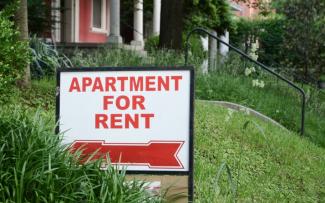Shopping for a rental property? Beware of fake listings!
“$500/month for a 3 bedroom, 3 bath townhome in the heart of Washington, D.C.—all utilities, cable and internet included!”
“$50/night for beachfront 2 bedroom house near Ocean City, Maryland – with pool and beach access”
If you find rental listings like the ones above and feel like it’s too good to be true, trust your instinct because it’s probably a scam! Fraudsters are increasingly using fake listings to steal money and financial information from people who are on the hunt for great deals on long-term leases and short-term vacation rentals. Protect yourself from these scams by learning how they work and how to spot them.
How a Rental Scam Works
Scammers primarily rely on two types of rental scams:
- Hijacked listings: A hijacked listing copies a legitimate advertisement—photos, location, description—and posts it on another website with different contact information. This type of scam seems legitimate because it mimics a real property, but the person you are communicating with is a scammer, not the owner.
- Phantom rentals: A phantom rental is a listing that uses photos of a property that is not located at the advertised address. This scam attempts to steal your money or information before you find out the property does not exist.
Both types of these scams lure renters with extremely low rental prices and lavish amenities. Once they have your attention, they request money (such as an application fee) or financial information for the property they cannot deliver. Victims sometimes don’t even realize they have been cheated until they show up to the property and find that it does not exist or is not for rent.
Tips to Avoid Rental Scams
Good deals on rentals do exist, but make sure you do your research to make an informed decision. Here are some tips to avoid being scammed:
- Beware of a deal that seems too good to be true. Make sure that the listing is comparable to other properties in the area.
- Research the property. If you are signing a long-term lease, you should always view the property in advance of sending money or signing a contract. To avoid hijacked listings, use an online search engine to search some of the listing’s key words to see if the property pops up on another site with different contact information; if it does, it’s probably a scam.
- Avoid properties where the landlord will not reveal the address. Do not send money or share financial information if the landlord is unwilling to give you an address that you can research. This is a warning sign of a phantom rental.
- Don’t rush into a decision. It is a red flag if a landlord insists that you must act immediately to take advantage of a property. The scammer may be hoping to rush payment before you have time to research the listing.
- Never wire money or pay with prepaid card. If you use these forms of payment and are scammed, it is difficult to get your money back.
How to Report a Scam
If you are a victim of a rental scam, contact OAG’s Office of Consumer Protection at (202) 442-9828 or consumer.protection@dc.gov, or submit a complaint online using Consumer Complaint Form.

